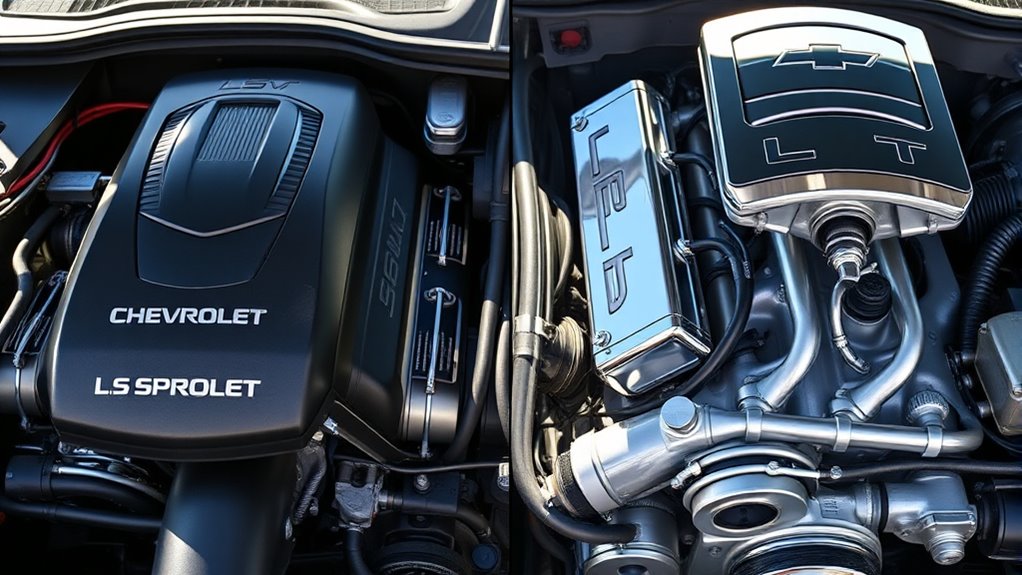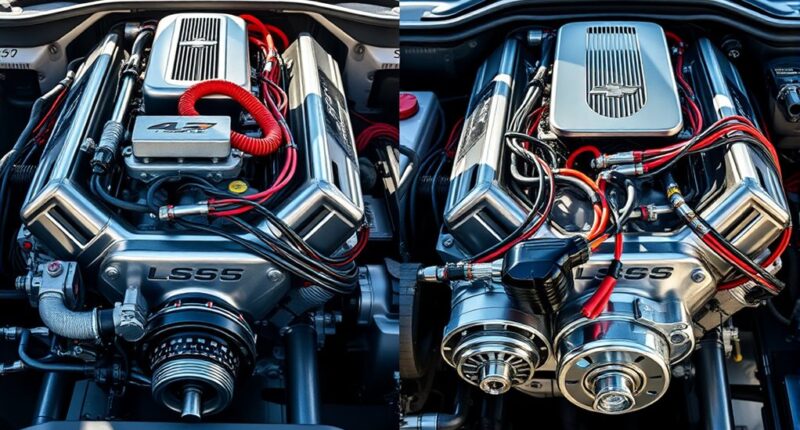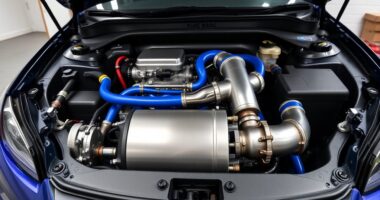Chevrolet’s LS and LT engines differ mainly in design, technology, and purpose. LS engines have a simple, robust architecture favored for performance upgrades, making them popular among enthusiasts. LT engines feature advanced tech like direct injection and variable valve timing for better fuel efficiency and emissions compliance. If you want to understand these engines’ core differences and what suits your driving style, stick around to uncover more details.
Key Takeaways
- LS engines have a simple, traditional design ideal for easy modifications and high performance, while LT engines incorporate advanced tech for better fuel efficiency.
- LS engines are favored for aftermarket upgrades like camshafts and superchargers, offering greater customization potential; LT engines focus more on modern features and efficiency.
- LS engines prioritize performance and durability, making them popular among enthusiasts; LT engines integrate direct injection and variable valve timing for improved fuel economy.
- LS engines tend to sacrifice some emissions and fuel efficiency, whereas LT engines are designed to meet stricter emissions standards and deliver better MPG.
- LS engines are best suited for performance cars and racing applications; LT engines target daily drivers seeking modern tech, comfort, and efficiency.

When choosing a Chevrolet engine, understanding the differences between the LS and LT series can help you make a more informed decision. Both engine families are popular choices, but they serve different purposes and appeal to different types of drivers. If you’re considering performance upgrades or aiming for better fuel efficiency, knowing what sets these engines apart is essential.
The LS engine series has long been celebrated for its robust performance and durability. Designed initially for performance vehicles and muscle cars, LS engines are known for their straightforward architecture, making them a favorite among enthusiasts who want to modify or upgrade their engines. Because of their simple design, LS engines tend to respond well to performance upgrades, allowing you to boost horsepower and torque with aftermarket parts like camshafts, headers, or superchargers. If your goal is to maximize power and tweak your engine for racing or high-performance driving, the LS series offers a solid platform.
On the other hand, the LT engines are more modern and incorporate advanced technology aimed at improving fuel efficiency and ride quality. They feature direct injection, variable valve timing, and active fuel management, which work together to optimize power delivery and reduce fuel consumption. If you’re looking for an engine that balances performance with better fuel efficiency, the LT series is a smart choice. These engines are designed to meet stricter emissions standards while still delivering adequate power for everyday driving. They tend to be more refined and equipped with features that enhance comfort, making them ideal if you want a reliable daily driver without sacrificing too much in terms of efficiency.
While the LS engines excel in performance upgrades, the LT engines focus on a combination of efficiency and modern features. If you’re an enthusiast eager to push your engine further, the LS offers more aftermarket support and room for customization. Conversely, if you prefer a more modern, fuel-efficient vehicle that still provides decent power, the LT series might better suit your needs. Keep in mind that upgrading an LS engine can be more straightforward and cost-effective if performance is your priority, whereas the LT’s advanced technology might require more specialized knowledge when it comes to modifications.
Ultimately, your choice hinges on your driving goals. If you want a proven platform for performance upgrades and don’t mind sacrificing some fuel economy, the LS series is the way to go. If you prefer modern features, better fuel efficiency, and a smoother ride for daily use, then the LT engines are worth considering. Both series have their strengths, so understanding your priorities will ensure you pick the right engine for your Chevrolet.
Frequently Asked Questions
Are LS and LT Engines Compatible With the Same Vehicle Models?
When considering an engine swap, you might wonder if LS and LT engines are compatible with the same vehicle models. Generally, they’re not directly interchangeable due to compatibility issues like mounts, wiring, and ECU differences. You’ll need to evaluate your vehicle’s specifications and possibly modify components to verify a smooth fit. Always research thoroughly or consult a professional to avoid costly mistakes and ensure your engine swap is successful.
Which Engine Offers Better Fuel Efficiency—Ls or LT?
Think of your engine choice as choosing between a sprinter and a marathon runner. The LT engine typically offers better fuel efficiency, making it the sprinter that conserves energy over long distances. Its efficiency comparison to the LS shows it’s designed for better fuel economy, helping you save on gas and reduce emissions. So, if you’re after a more economical ride, the LT is your go-to, while the LS favors power over efficiency.
Can LS Engines Be Upgraded to LT Specifications Easily?
Upgrading an LS engine to LT specifications isn’t straightforward, but with the right performance tuning and aftermarket modifications, you can enhance its performance markedly. You’ll need to replace certain components, like the fuel system and cylinder heads, and possibly reprogram the ECU. It’s a complex process that requires expertise, but with proper planning, you can achieve many of the benefits of an LT engine in your LS setup.
How Do Maintenance Costs Compare Between LS and LT Engines?
Imagine cruising down the highway, knowing your engine’s maintenance costs are predictable. When comparing LS and LT engines, you’ll find that LT engines often have higher maintenance costs due to more complex technology. Warranty coverage for both varies, but parts availability for LS engines tends to be more widespread and affordable. Ultimately, the LT’s advanced features can lead to increased repair expenses, while LS engines offer simpler, more budget-friendly upkeep.
Which Engine Has a Longer Lifespan Under Heavy Use?
When considering engine durability under heavy use, your focus should be on wear resistance. Generally, LS engines tend to have a longer lifespan because of their robust construction and proven durability, making them more resistant to wear over time. If you push your vehicle hard, you’ll likely find that the LS engine maintains its performance longer, providing better overall longevity and reliability compared to the newer LT engines.
Conclusion
So, whether you’re drawn to the legendary toughness of the LS or the modern finesse of the LT, understanding their differences helps you choose your perfect engine. Think of it as picking between a classic hero and a sleek innovator—each with its own story to tell. Ultimately, your choice shapes the heart of your ride. Are you ready to select the engine that’ll turn your driving dreams into reality? The road awaits your decision.









